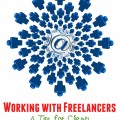
Successful collaboration between freelancers and clients is based on mutual benefits, trust and effective communication – we all agree on this. But what many may not realize is that the collaboration freelancer-client starts way before the contract is signed. Often, you need to prove you can build healthy business relationships in order to land the job.
Here are a few steps every freelancer should take before starting a work relationship with a new client – so successful collaboration can happen.
Make your freelance cover letter a master piece
Don’t send a standardized cover letter. Recycled cover letters tell your potential clients you don’t care about them or their projects. Instead, they think you see them like just another small business owner who has published a freelance job post.
Make your freelance cover letter personal. Make it specific. Address all questions asked in the job post – in detail and to the point. Don’t exaggerate your abilities – be honest and forth coming instead.
Think about the project and ask your questions. Contrary to common beliefs – asking questions doesn’t make you look stupid, neither does it show incompetence. When you ask well thought questions about project details, you demonstrate your true and deep interest toward the job. Read more dos and don’ts about writing your freelance cover letter.
Make an action plan prior to your interview
Assuming you got the interview, write down the points you want to discuss. And yes, it’s not a mistake, I said write down, all of it – every single point you want to discuss with your potential client before you actually start a contract with them. Such points could be deadline, workload, price, project specifics, etc.
Everything that ensures smooth work process or can cripple the workflow should be discussed before signing a contract and making a commitment.
In case the client wants to hear your proposed action plan and steps, write those down, too. Don’t reveal too many details – after all, the contract has not started yet so you shouldn’t be giving away your ideas and work for free.
However, be sure to give enough details to showcase your practical knowledge and skills – what you will do, when, how, why. Once you are hired, it will be easy for you to develop the plan into greater details and stick to it until the work is done.
To ensure successful collaboration, agree on targets and timeline
I have seen this too many times not to say it loud and clear:
Do NOT agree to anything you don’t understand or disagree with.
To start a successful collaboration and build a healthy business relationship with this new client of yours, you need to take active part in the conversation. Speak up if you have any doubts or concerns.
You can’t work well with someone if you don’t speak the same language or if you are not on the same page, right? For that reason it’s of crucial importance to discuss and agree on both requirements and expectations. Scope of activities, targets to be met and timeline should be communicated in great detail.
If you don’t understand the set goals – ask questions to better understand the requirements and the end result expected of you. Remember to get those set goals, requirements and expectations in written. All that you agree on before starting the contract should be confirmed in written for future reference if/when needed.
Discuss and agree on contingency plan
Both freelancers and clients are people. And where are people, there are changes and problems 😀
Everything can happen so you should discuss and agree on a contingency plan before you enter a contract.
A few examples of when the project is delayed for reasons beyond your control and a contingency plan would come in handy:
- the client’s website doesn’t work because they have not paid their hosting bill
- you need something from the client but they don’t give it to you immediately and you sit around and wait for them for 2 days instead of working
- you ask for approval of a single element but the client doesn’t reply to your emails in timely manner so you cannot move forward with your tasks before they do, and so on.
All these hypothetical scenarios can become real situations and delay the project completion despite your work principles and hard work. However, technically – you have not done your job because you have not completed the project in the agreed time frame.
If you have agreed in advance on contingency plan and work process who should tell what to whom and in what order – you would be ensured of such “penalties” if the project gets delayed but you are not the faulty party in reality.
Again, make sure all terms you agree on are confirmed in written.
And last but not least, be honest and always ask for help if you need it!
If you encounter a problem in the course of your work – ask for help!
If you have a personal problem and cannot work for 2-3 days which in turn will lead to project delay – let your client know as early as possible.
Clients are people with personal problems, too – they will understand (maybe)… in any case don’t turn it into a habit. Don’t come up with excuses for not doing your job; don’t abuse your clients’ trust.
Tell them in advance about the possible delay so that they can take countermeasures on their end. It is highly unprofessional to wait until the last minute. Imagine the following scenario – the day your assignment is due, you come up with the lame excuse “I am sorry but I had personal problems and I couldn’t work for 2-3 days so I haven’t completed it yet, I will need some more time”. If someone told you this – would you understand?
I wouldn’t. No one would. Not because what you were saying isn’t true but because you waited until the last possible minute to tell them. This way there is absolutely nothing they can do to make sure that you not doing your job won’t affect them negatively.





Diana, here is a tip for you: make your tweets a bit shorter to allow for retweets! Ideally, you should only use 110 of your 140 allowed characters. Some people/organizations have long handles and if your tweets are going to get retweeted, the initials RT are added to the original tweet, along with the retweeter’s handle.
I’ve modified the ones I have shared to fit, but not everyone will do this!
Just a heads up!
By the way, I share your content because it is good, and I’d hate to have you miss out on others reading it simply because your tweets are too long and they cannot tell their friends/followers about it!
I know, i know – sometimes it’s just not possible to fit in 110 characters. If/when twitter is higher on my priority list – i sure will start paying more attention to this. And meanwhile, if someone really wants to share my content, wants to leave space for long handle retweets AND doesn’t want to edit the text of the lazy tweet, well – they can use the generic one – it is always short enough LOL
Thanks for the tip, Lorraine – always good to know you are there looking out for me while spreading the word 😉 And anything to add on the topic of the post about starting effective collaboration? 😛
I think finding time to schedule an initial meeting is super-important. I’m finding that, with working with Greg, we should have ironed out many details beforehand. Ugh. Not that I’m complaining, but hey, a little collaboration goes a LONG way. Frustration and negative feelings can be eliminated with some face time. This is hard to achieve when two people are in different time zones, but Greg and I are in the same one! This makes it exasperating sometimes!!!
What do you mean, initial meeting? And yes, the way you will be working with Greg – my blog will b super useful to you (AND Greg) 😛 So keep on reading… 😉
I said “initial meeting” because you asked if I had anything to add to this discussion about collaboration.
By the way, things have gotten better since I spoke my mind and let my new boss know how I was feeling. 😉
I also learned to be more tactful. Sorry for airing our personal laundry here, Greg!
hahaha, i have not seen any dirty laundry yet but okey 😀
and i got why you said what you said about the initial meeting – i didn’t get what you mean by “initial meeting”… the way i understand the meaning of “initial meeting”, usually the interview is that initial meeting – it may be the only one, or followed by others – but that;s the initial meeting in my book. However, from your context, i see you mean something else – so i was wondering what 😀
and yes, Lorraine – go ahead and tell others how you feel, truthful communication is always the best policy when it comes to successful collaboration – of course, be professional about it 😉
Diana, these principles are great and can apply to ANY industry in addition to freelancing. The key here is to be detail oriented and have a very open communication style with your clients. Another thing to add about contingencies, if the new client has an issue with those kinds of items that could signal a red flag that this is going to be an issue throughout the relationship. Getting it all on the table can help make both of your lives easier.
I second that, Johnny! Indeed if the client is reluctant to put everything on the table, there gotta be something he’s trying to hide and could potentially harm, the smooth collaboration. Thanks for the addition!
I just wanted to let you know that I have bestowed an award upon you, because you are one of the bloggers I admire! You can read about this award at https://wordingwell.com/the-one-lovely-blog-award-gets-this-lovely-blogger-to-identify-her-rapist-lorne-chabot/ – and whether or not you choose to accept it is totally up to you! 🙂
Thanks, Lorraine! I actually already saw and commented on that post before i even saw your comment 😉
On a side-note – since when you use comments like email? 😛 Not sure if big G is or isn’t frowning upon off-topic comments. hm, should check and blog about it LOL
Sorry – it’s just habit to notify my nominees via a comment. I apologize to you and to Google for starting a conversation unrelated to your post topic. Let me rectify that right now.
I am being honest and up front with you, as I am with anyone I work with, even though WE are not in a client-boss relationship. I agree with your concept of agreeing upon all things, in writing, before entering a contract. Finding common ground and beginning a work relationship is essential to productivity, since resolving questions before they arise and become problematic issues is a more positive way to proceed with a work order. Don’t you agree?
There, how’s that for a response? It expresses my opinion and solves any issues your blog may have with search engines. LOL But…true, I think!
Sometimes you need to have conversations in your comments. Google likes it when people engage in discussion, you know.
Um, I’m a smart cookie, too, Diana. 🙂
I ALWAYS write pertinent points down before meeting potential clients or when I’ve gone on teaching interviews in the past. I know from experience those things will go right out of my head if I don’t have them in front me.
It’s a great habit you have there, Jeri – it can only help you now that you are freelancing your editing skills 😉 Thanks for stopping by!
All excellent tips, Diana. Doing all this advance preparation will avoid misunderstandings once you are working with the client. Get everything in writing and have the client sign it. This protects both parties. And when the inevitable delays and problems arise — as they always do — be open with the client about what’s gone wrong and how it can be fixed. Try not to play the blame game. Just get it done and move on.
Oh, this is SO true and important, Jeannette – i wish all clients and freelancers shared your thought about not playing the blame game but being open and figuring out how to fix things instead. Freelancers and clients alike should be open minded and work together toward a greater good and common goal. Thanks for stopping by 😀
Great tips. I smiled because they were what I used as an executive working with clients and employees alike. The fact is I really need to look at using them now as my business continues to grow. Thanks for the reminder. 🙂
sure thing, Susan! And i smiled too – because when you said you used them all with clients and employees alike, i though “ah, i wish all clients knew it is in both parties’ interest to agree on deliverables and deadlines” 😉 Have a great day!
Excellent tips! The importance of an innovative cover letter is a great point. It captures attention and lets the client know that you are fully engaged. Just adding one detail about their business that reflects that you took the time to look at their website is often enough to get them to want to talk to you. I also like your suggestion to write down the points you want to make in advance. Sometimes you get caught up in a good discussion and forget things you wanted to ask, by writing it down you have an easy reminder.
Right, doing a little (as checking their website and including a detail in your cover letter) does go a long way – thanks for adding to the conversation, Debra!
Very Useful.. I was thinking to become a freelancer & I got help from you.. 🙂 Great Article… I’m gonna bookmark it for future use also…!!
Thanks for your positive feedback, Pratik – glad i could help! Add the blog to your reader for more and regular updates. Or better yet, subscribe to my newsletter – on top of the regular updates, there’s also a monthly tip and a free ebook in the mix 😉 Details here.